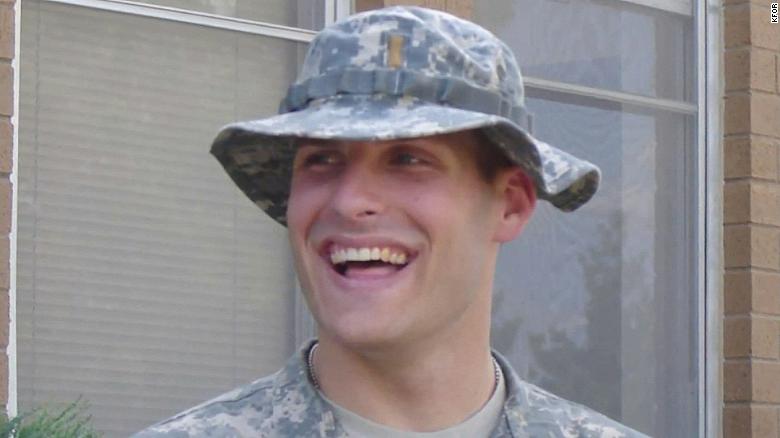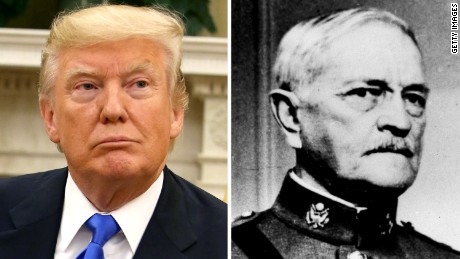(CNN)Where the military sees possible war crimes, President Donald Trump sees injustice.
He is considering Memorial Day pardons for a number of US service members either convicted of or facing trial for war crimes in Iraq and Afghanistan.
And by some strange coincidence, he is considering these pardons as the most notorious of American war prisoners -- the "American Taliban" John Walker Lindh -- is scheduled to be released Thursday, after serving 17 years of a 20-year sentence.
The presidential power to pardon is near-absolute in the Constitution -- "except in cases of impeachment."
But no previous recent president has pardoned a murderer. Until Trump.
There have been other cases of clemency for killers, as when President Barack Obama downgraded death sentences to life without parole, but the vast majority of pardons are for nonviolent crimes. Data on the Justice Department's website includes the nature of a pardoned person's crime only back through George H.W. Bush. Note: Most murders are prosecuted at the state and not the federal level.
Obama and President Bill Clinton also commuted the sentences of violent revolutionaries fighting for Puerto Rican independence responsible for multiple bombings in the US during the '70s and '80s. But they gave clemency only to those whose crimes had not led to deaths.
Trump crossed that line this month when he pardoned Michael Behenna, who had been sentenced to prison in 2009 for unpremeditated murder in the killing of an Iraqi detainee and released on parole in 2014 after his sentence was reduced.
That Trump is considering other pardons for military crimes on a short timeline before Memorial Day took the Department of Justice and the Pentagon by surprise and added new context to the pardon power, which he's already used to reward political allies and send political messages.
Here's a look at the history and practice of presidential pardons for service members.
Trump's praise for war crimes, shooting deserters
This issue first and foremost recalls Trump's repeated endorsement of behavior that could easily be classified as war criminal.
During the 2016 presidential campaign, Trump admiringly repeated an apocryphal story about Gen. John Pershing shooting Muslim prisoners with bullets dipped in pig blood -- because it violated Muslim law -- in the Philippines more than 100 years ago.
It probably wasn't a true story, but the point is that Trump liked it. He liked the idea of US troops killing 49 prisoners and disrespecting their religion in order to make the 50th tell other people what had happened.
It would also be a war crime to shoot prisoners.
He endorsed the use of torture for terrorists before his first secretary of defense, retired Marine Gen. James Mattis, convinced him it would be a bad idea. Mattis left the Pentagon, remember, because he disagreed with Trump about Syria, Afghanistan and Russia. All of the generals Trump once surrounded himself with in top administration posts -- Mattis, his former national security adviser H.R. McMaster and his former chief of staff John Kelly -- have gone at this point.
Trump said US soldier Bowe Bergdahl, who had been held as a prisoner of war for years in Afghanistan, should be shot for desertion after he walked off his base in 2009. A military court gave Bergdahl no additional prison time after he pleaded guilty.
The new chapter in the annals of Trump and military justice is the news, first reported in The New York Times, that he's considering pardons for two American service members who are anticipating trial on murder charges.
He's also looking at the case of Marines convicted of urinating on dead bodies and the case of a contractor, once employed by Erik Prince's now-defunct Blackwater security company, convicted in federal court of first-degree murder for his role in the killing of 14 Iraqis in 2007.
But it is the idea of pardons for accused service members who have not yet gone to trial and been convicted that is raising the most concern for some military law experts.
Army Maj. Matthew Golsteyn divulged his role in the killing of a bomb maker in Afghanistan during a job interview with the CIA and subsequently in a Fox News interview. The Army says the killing was premeditated and Golsteyn is set to stand trial. He could face the death penalty.
Navy SEAL Edward Gallagher is charged with stabbing a wounded man to death, shooting at a male and female noncombatant and obstructing justice while deployed in Iraq. His own teammates turned him in, but Gallagher, who has pleaded not guilty, has found defenders in the media and on Capitol Hill.
He was allowed to leave the brig after Trump tweeted about the case. The President also tweeted about Golsteyn.
"At the request of many, I will be reviewing the case of a 'U.S. Military hero,' Major Matt Golsteyn, who is charged with murder. He could face the death penalty from our own government after he admitted to killing a Terrorist bomb maker while overseas. @PeteHegseth @FoxNews"
The closest a modern president has come to a pardon for war crimes was Richard Nixon's treatment of William Calley, who was convicted of premeditated murder for his role in the Vietnam War My Lai massacre of unarmed civilians in 1968. Nixon released him to house arrest and his life sentence was commuted by Nixon's secretary of the army, Howard Calloway.
The first difficulty of assessing war crimes in the US is that there is no commonly accepted definition of the term and the US is not a party to the Rome Statute, which created the International Criminal Court in 1998. In fact, the Trump administration recently revoked visas for the International Criminal Court chief prosecutor, which CNN reported was part of an effort by the US to deter ICC actions against US service members in Afghanistan.
That doesn't mean the US military is not prosecuting those suspected of war crimes, according to Chris Jenks, a law professor at the Southern Methodist University Dedman School of Law who is a former Army judge advocate. Jenks is an expert in the law of armed conflict who wrote about possible Trump pardons for the Just Security blog. He answered some questions about Trump's possible move and what it could mean for the military justice system.
What is a war crime and are US service members charged with war crimes?
"As a general proposition, when people say war crimes within the international legal community, what we're talking about is serious violations of the law of armed conflict or international humanitarian law, serious violations of the laws of war," said Jenks.
He pointed out that Calley was not charged with a war crime, but rather hundreds of charges of murder. Similarly, he said Sgt. Robert Bales, who killed 16 Afghan civilians, was charged with multiple counts of murder, even though, as Jenks said, "I would tell you under international law definitions Sgt. Bales committed one or more war crimes."
Is there any precedent for what Trump is doing?
"In terms of has there ever been an instance where the commander in chief has preemptively pardoned a US service member facing a court-martial for murder? No, I'm not aware of that," said Jenks.
"You have an entire military justice apparatus," he said, which is set up to make sure justice is served. It starts with the Navy SEALs who reported Gallagher, for example, continues through the Naval Criminal Investigative Service agents who collected evidence and the admiral who recommended that Gallagher be prosecuted.
"What's the point of having the military justice system if it's not allowed to operate?" asked Jenks. "What are you saying to the commanders and the judge advocates who participate in the process when you don't let the military justice process proceed?"
Are there adequate protections for US service members accused of war crimes?
Given that American service members are operating in war zones, it's important that they have protection from the US government.
"If there was ever a circumstance by which I was accused of serious wrongdoing and I was offered a choice of being prosecuted in a state court, a federal court, or a military court, I would run to a military court because of the protections and the process that it affords service members, frankly, well in excess of the protections and processes that are afforded in state and federal court," said Jenks.
He said there is a larger problem underlying Trump's potential pardons, which is that service members are standing accused of these crimes but also standing in judgment of each other.
"The broader unstated point is the President and those who support pardons are trying to position themselves as this is an us against them. But when you think about who is the us and who is the them -- it's US service members on both sides of this equation."
He argued that after the criminal justice system is allowed to work, the decision to pardon becomes a matter of judgment. There is precedent for preemptive pardons, however. More on that in a moment.
Retired Army Lt. Gen. Mark Hertling said on CNN that usurping the military justice system will hurt the military as a whole.
"If you lose control of your forces, you're no longer a military force, you're just a mob," said Hertling, a CNN analyst.
Chelsea Manning and war crimes
Obama did not pardon but rather commuted the sentence of Chelsea Manning, the convicted leaker of classified information to WikiLeaks -- drawing widespread criticism since Manning arguably jeopardized national security. Supporters argue she uncovered US war crimes, like the killing of Iraqi civilians, including two who worked for Reuters. In that instance, perhaps proving how difficult and rare it is for the military to seek charges against its members, the only charges that were brought after an investigation into those killings were the ones against Manning for her leaks.
Unrelated to her commutation, Manning was ordered back to jail this month after refusing to testify before a grand jury as part of a federal investigation into Julian Assange and WikiLeaks.
Confederates and draft dodgers pardoned
There have been massive military-related pardons in American history. President Andrew Johnson pardoned Confederate soldiers after the Civil War. More than 100 years later, President Jimmy Carter essentially pardoned Confederate President Jefferson Davis by posthumously restoring his citizenship. Carter also, on his first day in office, pardoned draft dodgers after Vietnam.
There have also been preemptive pardons, as when George H.W. Bush, in the closing days of his presidency, pardoned six people involved in the Iran-contra scandal who had not yet gone to trial, including Defense Secretary Caspar Weinberger. The move allowed Bush to avoid being called as a trial witness.























